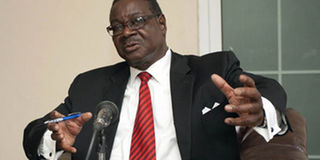Mutharika's triumph ended convoluted charade

Malawi's Democratic Progressive Party (DPP) President Peter Mutharika speaks during a press conference on May 24, 2014 in Blantyre. The announcement late Friday that Mutharika had won Malawi’s disputed presidential vote ended a convoluted charade that had left the country’s electorate on tenterhooks for days. AFP PHOTO
What you need to know:
Mutharika and al-Sisi may be in power by they did not get the support of majority of the electorate
The announcement late Friday that opposition candidate Peter Mutharika had won Malawi’s disputed presidential vote ended a convoluted charade that had left the country’s electorate on tenterhooks for days.
Further, the electoral commission’s declaration put an end, at least for the time being, to incumbent President Joyce Banda’s hopes of becoming a democratically elected president.
Mutharika, the brother of former President Bingu wa Mutharika and leader of the Democratic Progressive Party, won the disputed polls with 36.4 per cent of the vote.
Having ascended to the presidency two years ago after the death of her predecessor, outgoing President Banda’s administration has been seriously scarred by scandals and allegations of massive corruption.
PRENNIAL MALAISE
The country’s perennial malaise was exemplified by the so-called ‘Cashgate’ saga, which led to donors cutting aid to the impoverished country.
Also faced with intensifying internal crises, during her stint at the helm, Banda appeared to have been fumbling in the dark, and was sadly unable to take firm charge of Malawi, one the poorest nations in the world.
Not surprisingly, the embattled former president only managed to come third in the May 20 general elections, during which anxious Malawians queued to elect leaders who would steer the country in the next five years.
With about 7.5 million people eligible to vote in the elections, President Banda certainly knew she had a political battle of gigantic proportions on her hands, and from the onset came out fighting tooth and claw for survival.
It soon became clear, however, that Malawian voters were unprepared to give the lady a second go at the presidency during what was widely described as the closest-fought poll in 20 years.
EMBARRASSMENT
When all the chips were down, the Malawi polls were an embarrassment all round, with a comedy of errors that could have led to a constitutional crisis sparked by President Banda’s initial decree to nullify and postpone them.
Oddly, amid the chaos a dithering electoral commission at one point even admitted that there was evidence of irregularities in the polls as alleged by Banda and her supporters.
The commission even identified irregularities in 58 centres, where the number of the people who voted exceeded that of those registered.
Across the continent in Egypt, the polls held there were marked by a low turnout that led to a measly 25 million Egyptians voting. That development raised queries about the mandate of ex-army chief Abdel Fattah al-Sisi, the eventual winner, who reportedly garnered over 96 per cent of the vote.
The widespread misgivings about his legitimacy were lent credence when the country’s military-backed authorities extended voting to a third day in a futile bid to boost turnout.
Ultimately Sisi, clearly did not have the support of a convincing majority of Egyptians. His camp, therefore, had reason to be disappointed.





